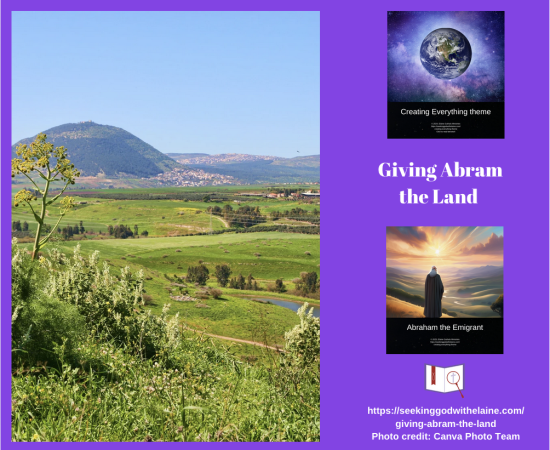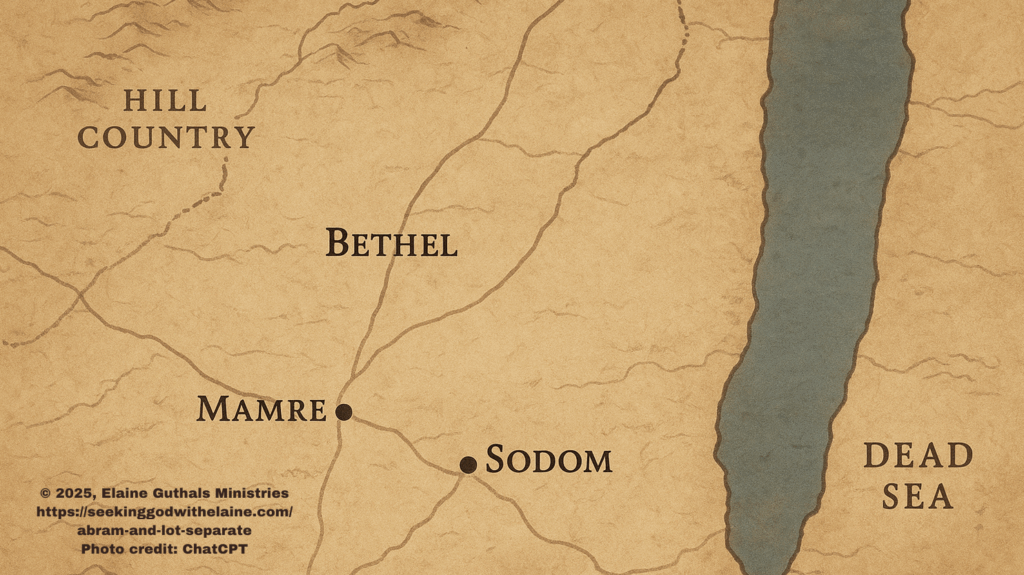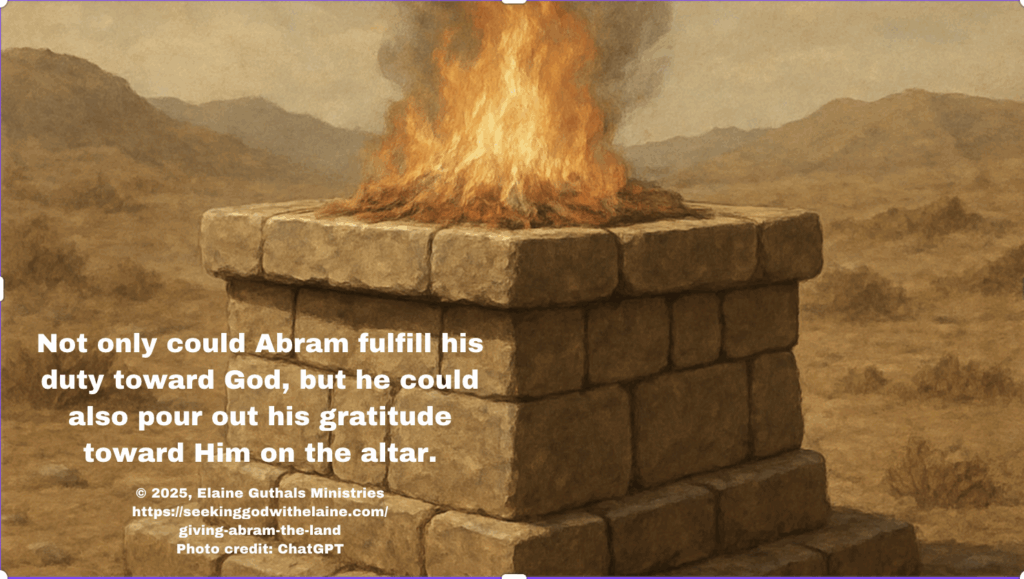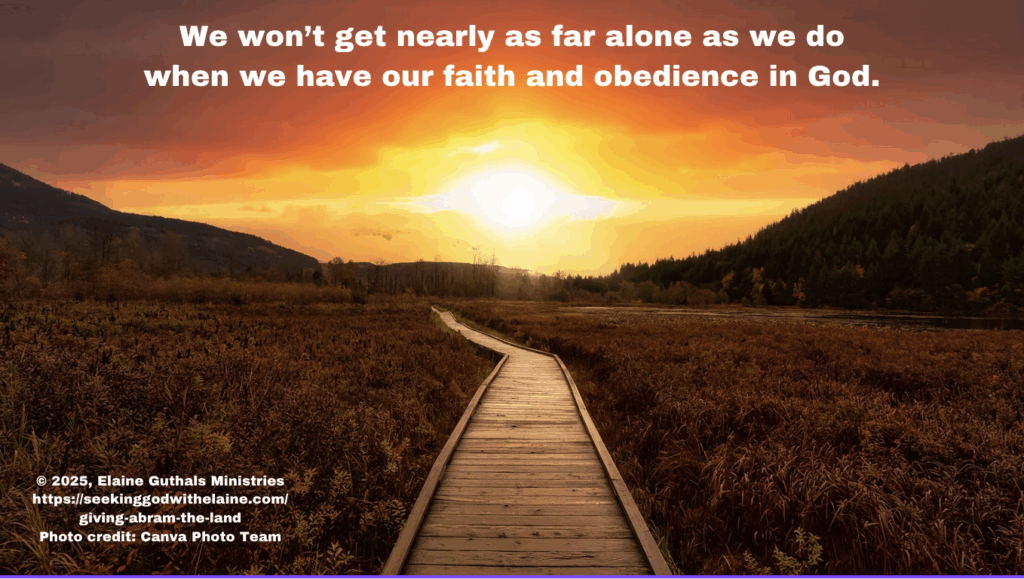Abram was starting a new chapter in his life. This devotional reading looks at the comfort God gave Abram after his separation from Lot.
Nuggets
- God gave the land of Canaan to Abraham as a permanent possession.
- God gave the land to Abraham and his descendants — but Abraham didn’t have either promise yet.
- God was already setting up His eventual blessing of the nation of Israel.
- Abram made his home in Mamre in Hebron.

Abram’s world had been rocked. He and Lot separated.
Since Lot’s father/Abram’s brother Haran died, uncle and nephew had been living closely, if not together. Surely since their emigration, they traveled together.
But now both had become wealthy men. The problem was they did not own land in their new country on which to graze their flocks. This led to them separating.
Let's Put It into Context
To read devotions in the Creating Everything theme, click the button below.
Devotions in the Abraham the Emigrant series
Land to Come
“After Lot had gone, the Lord said to Abram, ‘Look as far as you can see in every direction — north and south, east and west. I am giving all this land, as far as you can see, to you and your descendants as a permanent possession’” (Gen. 13: 14-15 NLT)
God gave the land of Canaan to Abraham as a permanent possession.
Once Lot moved, God came to Abram. Yes, this is another instance of God coming to humans.
God had a special reason for coming. He clarified what land He was giving to Abram and his descendants.
God gave Abraham the land “… as far as you can see in every direction — north and south, east and west” (Gen. 13: 14 NLT). That is a lot of land.
But wait a second. Where are we again?
Bethel
The last location reference we had was somewhere in the land of Canaan. “So Abram settled in the land of Canaan, and Lot moved his tents to a place near Sodom and settled among the cities of the plain” (Gen. 13: 12 NLT).
In other words, Lot went east, and Abram went west toward the Mediterranean Sea.
Can we get any closer than that? “From the Negev, they continued traveling by stages toward Bethel, and they pitched their tents between Bethel and Ai, where they had camped before” (Gen. 13: 3 NLT)
Take a look at this map that ChatGPT created for me.

This is important. I kept thinking, why would God tell Abram to look in all directions?
Bethel was in the land that – in the future – would be given to the tribe of Benjamin. That was considered the middle of the Promised Land.
It became an important place in the future.
- It was a home for the Ark of the Covenant during the time of the Judges.
- It was a buffer between the Northern Kingdom and the Southern Kingdom.
- In fact, it was sanctuary city and religious center for the Northern Kingdom.
So, yes, Abram could see all of the Promised Land from where he was standing.
It is hard to tell it on this map, but Bethel was in the Hill Country. This area was a strategic position.
The Covenant Extended
We talked before about God’s covenant with Abram. We may think it is three different covenants, but it really is all part of one.
- Covenant established (Gen. 12: 1-3)
- Blessings of the covenant (Gen. 12: 7; Gen.13: 14-17)
- Sign of the covenant (Gen. 15: 1-21)
- Acceptance of the responsibilities of the covenant (Gen. 17: 1-27)
- Promise of the covenant (Gen. 18: 9-15).
When God initially called Abram, He didn’t say anything about land. He came back later and say, “Oh, yeah. There is land included.”
Now, God probably blew Abram’s mind. It wasn’t, “Oh, I’ll give you and the son I am going to give you a couple of acres.”
Ooo, baby. “Do a 360o turn. Everything you can see is yours.”
Talk about a gift!
What does Abram have to do for his part? He has to have faith and be obedient.
Keep doing what you are doing!
Children to Come
“And I will give you so many descendants that, like the dust of the earth, they cannot be counted!” (Gen. 13: 16 NLT)
God gave the land to Abraham and his descendants — but Abraham didn’t have either promise yet.
Abram struggled with the promise of descendants for the next four chapters or so. Giving Abram the land meant nothing if he didn’t have descendants – and he doesn’t have any descendants at this point.
Think about it. Abram’s Sanctification Road was about separation and faith. What is faith? “Faith shows the reality of what we hope for; it is the evidence of things we cannot see” (Heb. 11: 1 NLT). Faith that what we cannot see will come to fruition.
At some point, Abram may have thought that Lot was going to be his descendant. But they were separated.
Currier thought that God gave this reminder of the promise to Abram because Lot had just left. He wrote, “He gave him His own friendship in the place of Lot’s, for whose departure he sorrowed.”
Resource
What does Pastor Steve say? “Blessings are in the obedience” – even when the obedience is hard.
Road Trip
“Go and walk through the land in every direction, for I am giving it to you” (Gen. 13: 17 NLT)
God was already setting up His eventual blessing of the nation of Israel.
Yes, God has a plan. He doesn’t wait until the last minute to implement His plan.
God knew that the only land Abram was going to own in his lifetime was where he was going to be buried. But He had something bigger in mind.
God knew that, even though Abram would have a dysfunctional family, he was a family man.
So, God made sure Abram saw the land that would be given to his descendants. “It’s not yours but look at it.”
Isn’t that the same thing, basically, that God said to Moses (Deut. 3: 27). “You can’t go in the Promised Land, but you can see it.”
This road trip would have made it more tangible for Abram. He could see the land on which he was walking.
But think about it. Abram could only see that day. God could see hundreds of years into the future.
God was already setting things up that would not be needed until those hundreds of years were past.
Also, God was setting up things that would happen thousands of years in the future. It was all one big plan.
Move to Mamre
“So Abram moved his camp to Hebron and settled near the oak grove belonging to Mamre. There he built another altar to the Lord” (Gen. 13: 18 NLT)
Abram made his home in Mamre in Hebron.
Mamre was a village. Hood and Kalisch described it.
- A small mountain hamlet.
- A distance of 22 Roman miles from Jerusalem.
- Fertile ground.
- Closely tied to the city of Hebron.
- Where Isaac was born.
- Where Abraham, Sarah, Isaac, Rebekka, Jacob, and Leah were buried.
Resource
I like what Hood said when he compared Abram’s Mamre with Noah’s Ararat. He wrote, “If Ararat was the cradle of the races of our world, Mamre was the cradle of the Church.”
Resource
Because God chose to save Noah from the floodwaters, humans c0ntinued to live. Because Abram was faithful and obedient, because he was a righteous man, one of His descendants – Jesus – saved us from our sins.
Hood had another great observation. He reminded us that Abram emigrated from the plain of Shinar where they tried to construct the Tower of Babel. He said that there were stories that have survived documenting Abram’s hatred of idolatry.
In Mamre, Abram built another altar to worship and honor Sovereign God. He used these altars as a place to worship God and as a visual reminder of His presence. Not only could Abram fulfill his duty toward God, but he could also pour out his gratitude toward Him on the altar.

That devotion gave life to our faith today.
Making the Connections #1
We said that, after Lot left, God told Abram to keep on doing what he was doing.
The Pharisees thought they were going to get the same thing. Jesus said, “But what you are doing is wrong.”
Look at what I just read in Hebrew Yeshua v. Greek Jesus. Gordon wrote, “The second fundamental principle of Rabbinic/Pharisaical Judaism is the belief that the Rabbis have absolute authority to interpret Scripture, and what they say in religious matters is binding, even if it is known to be factually untrue.”
Resource
Even if it went against God’s commandment, the interpretation of the rabbis was law.
Yeah, I can see why Jesus was biting on the Pharisees.
God is not going to sanction that which goes against His laws and commandments. He makes the laws. He interprets them.
Our opinions are not taken into consideration when God does this.
Making the Connections 2
Okay. Let’s say that Abram stayed in Ur. What may have happened?
Well, Terah still would have died.
But what else?
- Abram may or may not have built altars because we aren’t told that he did build altars to God before he left.
- He may or may not be promised descendants.
- He may or may not have been promised land.
Yeah, I said may or may not, but I really believe it was not.
I say this because of what Meyer and Meyer said. In Elaine-speak, doing for ourselves brings us way worse results than doing it God’s way. He chooses who He will bless and what gifts they will receive.
Resources
We won’t get nearly as far alone as we do when we have our faith and obedience in God.

Making the Connections #3
No, Abram isn’t less of a person because he was faithful and obedient to God. He was not weak.
Meek doesn’t not mean weak.
Abram gave Sovereign God the glory that He is due. He listened to His Creator.
Yes, God makes some choices for us. We have to determine if we are going to obey Him.
How Do We Apply This?
- Have a practical faith and righteousness by which we regulate our lives.
- Live in peace with others.
- Listen when God speaks to us so that our reverence and duty are deepened.
- Believe in God’s promises.
- Leave what God is calling us to leave for His honor.
Resources
Father God. Your promises to us are far more then we can imagine – and much more than we deserve. Grow us so that we have a faith as strong as Abram’s. May our obedience be like his. Amen.
What do you think?
Leave me a comment below (about this or anything else) or head over to my Facebook group for some interactive discussion.
If you don’t understand something and would like further clarification, please contact me.
If you have not signed up for the email providing the link to the devotions and the newsletter, do so below.
If God has used this devotion to speak with you, consider sharing it on social media.